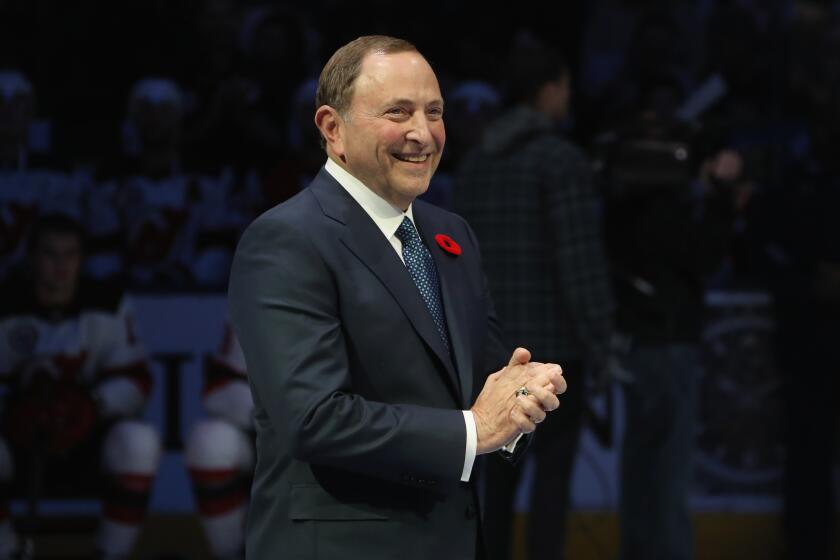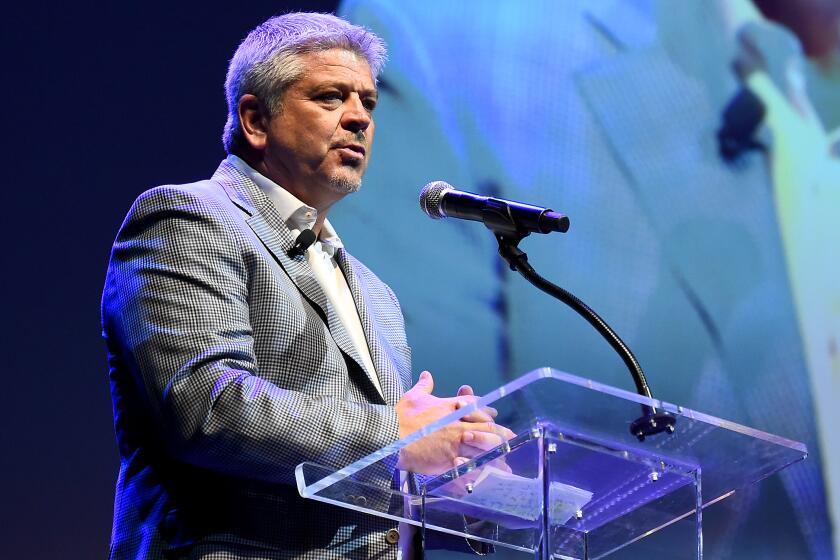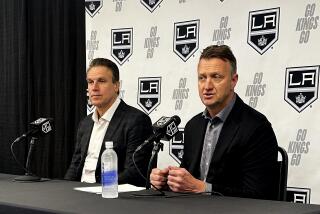Kings GM knows a return to Stanley Cup contention leans on prospect development
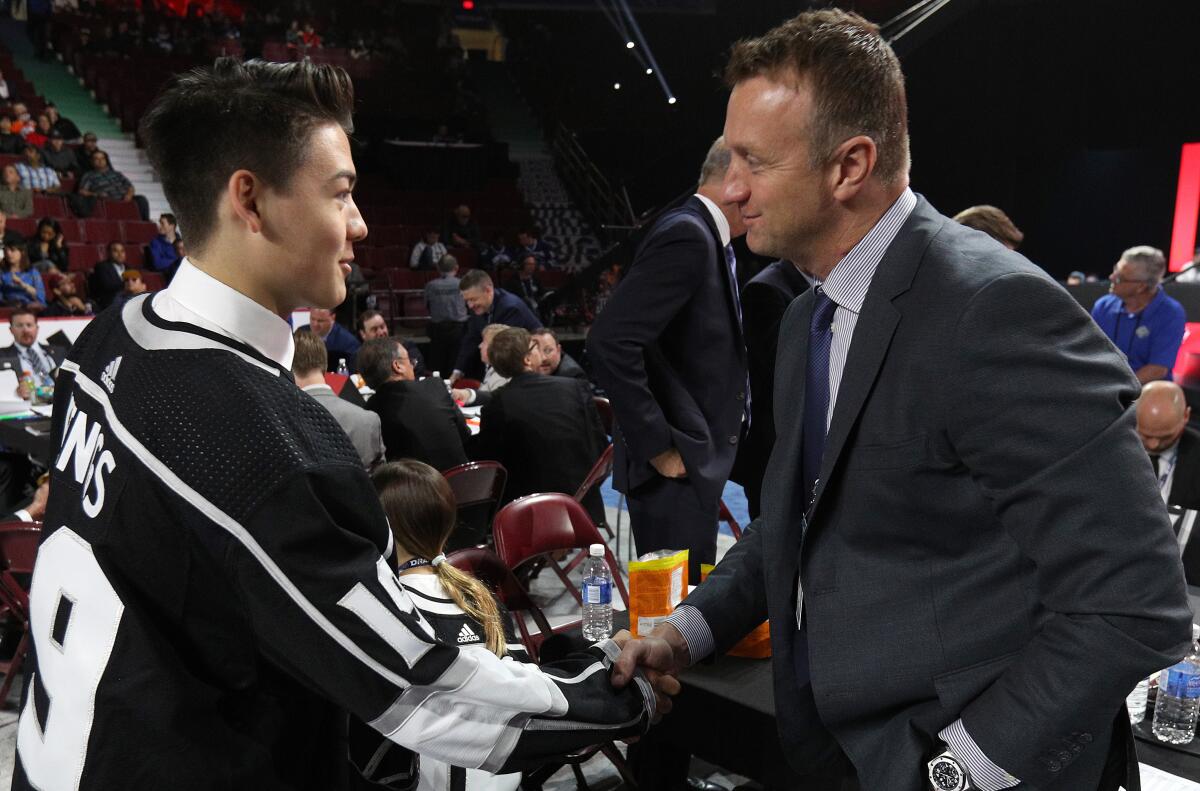
- Share via
Rob Blake took the stage last month at a state-of-the-franchise event to the playing of an organ and a smattering of applause.
With an easy smile and familiar face, the former Kings player is still treated like a fan favorite. But after the team’s discouraging two-season rut with him as general manager, Blake has started to sound like a man on trial.
“We want to be as transparent as possible,” he said, arguing his case to the rows of season-ticket holders seated before him. “Let you understand what the vision is, how we’re going to create this team.”
Blake has repeatedly testified to his missteps — how under his watch the Kings have slipped from playoff contention, hired three coaches in three years, whiffed on ambitious free-agent signings and lost the disciplined culture that led to two Stanley Cup championships.
In extending the current labor deal, the NHLPA is trusting NHL commissioner Gary Bettman to determine what is best for the players for the next few seasons.
Now, he is building his defense around the promise of tomorrow. He points to the Kings’ replenished farm system, a pipeline flowing with talent and widely considered one of the best in the league, as the central source of optimism.
“We’ve been focused on this the past three years,” Blake said. “We knew what we had and the direction we wanted to go. We wanted to protect our picks, protect our prospects.”
As the Kings trudge through an awkward transition, Blake is trying to protect his plan for the future, too, making sure the talent the Kings have collected has plenty of time to prepare for the NHL.
::
“It’s not horrific. But it’s bad.”
That was the ESPN.com assessment of the Kings’ prospect pool in August 2016, ranking it 29th in the NHL at the start of Dean Lombardi’s final season as general manager.
The cause of the decay was simple. Between 2010 and 2016, the franchise continually sacrificed draft picks and prospects to chase the Stanley Cup.
Some moves were worth the price. The Kings parted with their 2011 and 2012 first-rounders in deals for Dustin Penner and Jeff Carter, respectively, key pieces to Cup-winning teams. Other trades were less fruitful. They swapped their 2015 first-rounder — a lottery selection — and goalie Martin Jones for Milan Lucic. They coughed up their top pick in 2016 in a trade for Andrej Sekera.
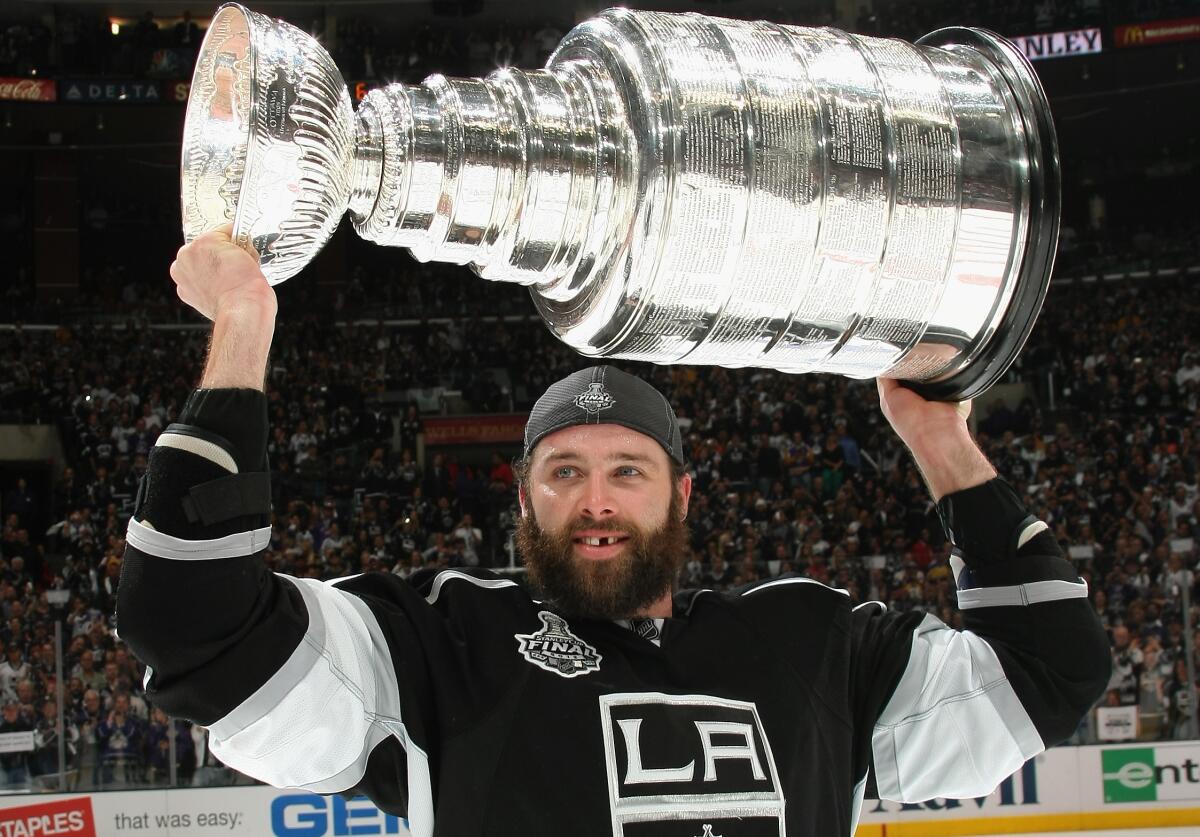
By the end of the seven-year stretch, the Kings had made just three first-round picks (Derek Forbort, Tanner Pearson and Adrian Kempe). Of their seven second-round selections, only 2010 draftee Tyler Toffoli has developed into an NHL mainstay.
Blake had a part in many of those decisions, having joined the Kings’ front office as an assistant general manager in 2013. But once he replaced Lombardi at the end of the 2016-2017 season, he pulled the Kings out of the league’s buyer’s market. He decided it was time to change course.
“That was our focus right from Day 1,” Blake said.
In their three drafts under Blake, the Kings have made four first-round picks, four second-round picks and 23 selections overall. Last year, they had four picks in the first two rounds, their most since 2003.
“We wanted to make sure we kept our picks,” said Nelson Emerson, director of player personnel. “We’re no longer in the business of trading those picks away to add an established player. With the vision of what we’re trying to do here, it’s important for us to stay on that path.”
First practices led by Los Angeles Kings coach Todd McLellan have followed the rhythm of a jazz band — high-paced with a tendency to stop on a dime.
Disappointing results on the ice helped the resurgence of the farm system. Missing the playoffs in 2017 and 2019 gave the Kings a pair of lottery selections and little reason to move their best assets.
Blake’s protect-the-picks philosophy has pushed the process along too.
He held onto his draft picks during his first trade deadline in 2018, even with the Kings headed toward the playoffs. He sent defenseman Jake Muzzin to Toronto last season for a first-rounder (which was used to draft defenseman Tobias Bjornfot) and prospects Carl Grundstrom and Sean Durzi.
He acquired an extra second-round pick to snag forward Samuel Fagemo 50th overall, then grabbed a goaltender, Lukas Parik, by design in the third round.
Even without the greatest lottery luck — the status of 2017 first-rounder Gabriel Vilardi remains unclear as he battles a chronic back injury, and the team dropped to No. 5 in the draft order this year, where they selected Alex Turcotte, despite having the second-best odds for the top pick — the reconstruction of the Kings’ prospect pool is still on schedule, if not ahead.
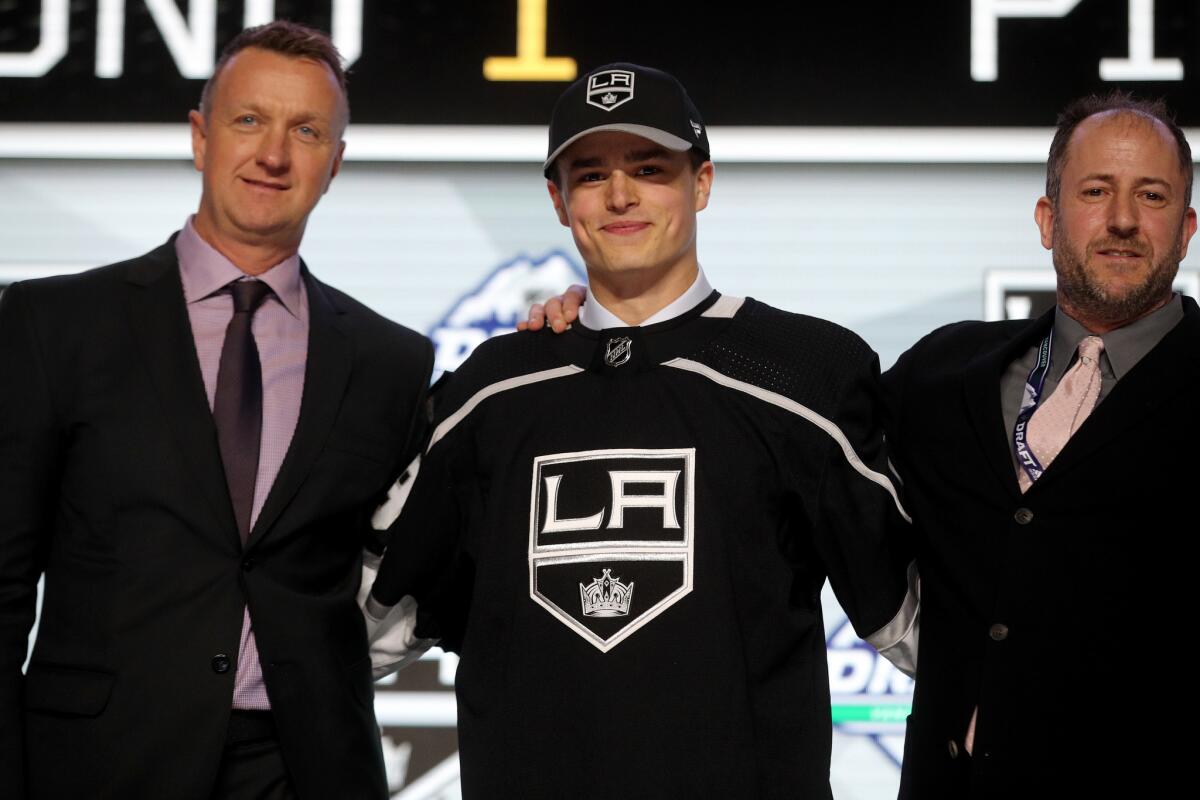
“Some of these young guys that have come in the last couple years have been really skilled, fast players,” said Mikey Eyssimont, a Kings draft pick in 2016 who has seen the talent level rise first-hand. “These guys have a mix of grittiness and skill, guys that can play power play as defensemen, guys that like to join the rush. The forwards complement it really well.”
Most prospect pundits concur. The Athletic called the Kings’ farm system the fourth-best in the NHL. Sporting News pegged it No. 2.
ESPN also placed it second-best, administering a new analysis of the Kings’ once-beleaguered pipeline: “One of the best and deepest prospect pools in the entire NHL,” it said.
::
Now comes the hardest part for the Kings.
Their restock is nearly complete, but most of their young players are still years from their primes. In the interim, it’s unclear how competitive the club’s NHL roster will be.
Back when Blake was planning out the rebuild, he thought this transition would be smooth. He admired teams such as the turn-of-the-century Detroit Red Wings, who repeatedly reloaded during a 25-year playoff streak that included four titles.
He studied the San Jose Sharks’ recent run, in which they’ve missed the playoffs just twice since 1998 despite several rounds of roster turnover.
Having inherited a championship-winning core in Anze Kopitar, Dustin Brown, Drew Doughty and Jonathan Quick, all of whom are locked into long-term contracts, Blake thought the Kings could achieve something similar.
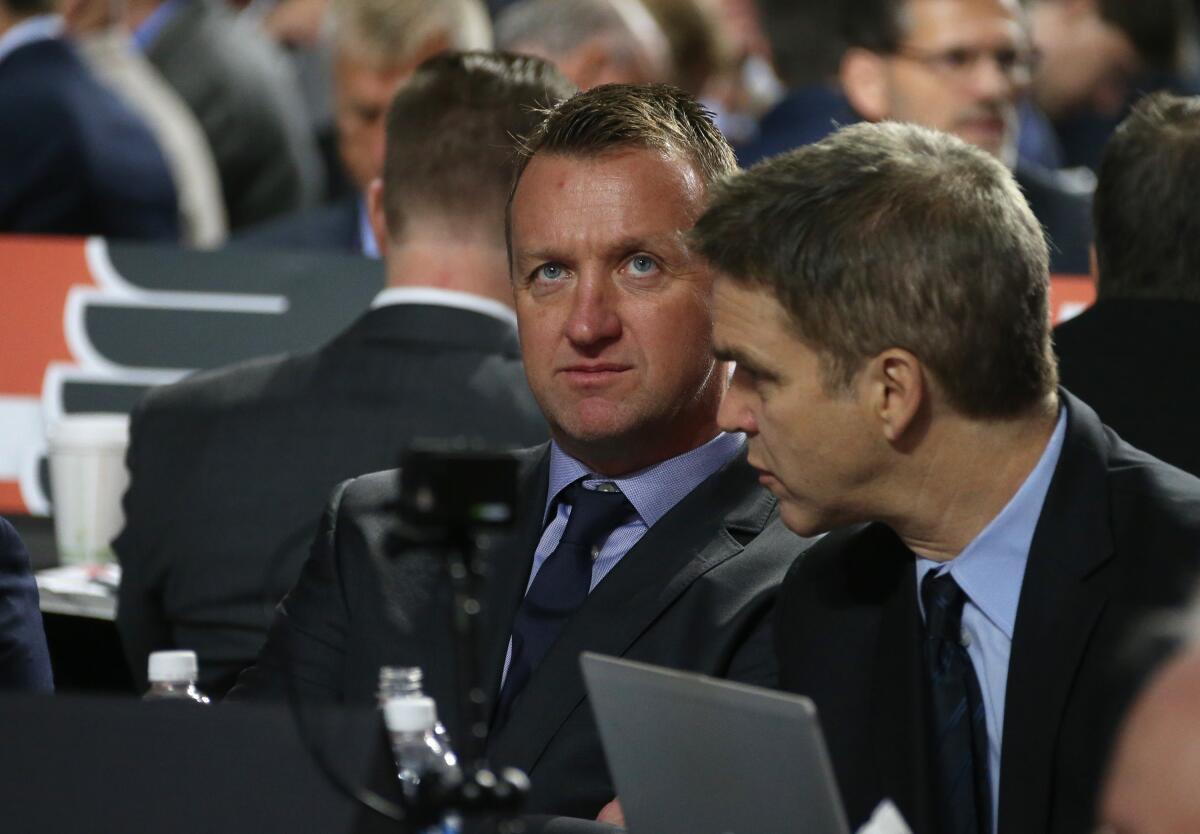
But since winning the Stanley Cup in 2014, the Kings have won one playoff game. Last season, they finished next-to-last in the league in points.
Blake is now simply relying on the Kings to rebound.
“You’ve got to make sure the veterans are willing to try to get better,” Blake said. “As soon as they’re not getting better anymore, then you’re probably better cutting ties and moving on.”
The Kings haven’t reached that point yet, Blake said. For now, he is hopeful that a new coach (Todd McLellan) and a new system can breathe life back into a club that seems to have lost its way, and buy enough time for the future stars to develop.
“There will be an influx,” Blake said. “But you have to put the development and the resources in those kids to be ready when the time comes. They’re not ready yet.”
More to Read
Go beyond the scoreboard
Get the latest on L.A.'s teams in the daily Sports Report newsletter.
You may occasionally receive promotional content from the Los Angeles Times.

